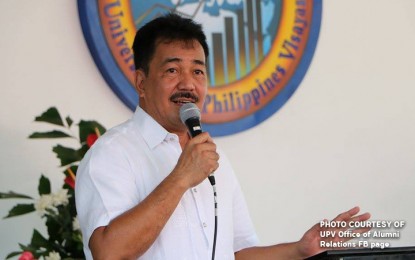
Commission on Higher Education chair Prospero de Vera
MANILA – The Commission on Higher Education (CHED) on Thursday said it will be pushing for a “flexible learning” arrangement in universities and colleges should the next academic year start in August.
During a virtual meeting of the House committee on higher and technical education, CHED chair Prospero de Vera said the “more practical solution” amid the coronavirus threat is to move toward flexible learning, which uses digital and non-digital technology.
“I think the concern on the opening of classes is really because many policymakers and the general public actually think that re-infection is a problem because when HEIs (higher education institutions) open they will do the usual face-to-face or residential learning,” de Vera said.
“The correct term that should be used is not online learning but flexible learning,” he added.
He said flexible learning is more encompassing than online learning, which requires connectivity and full use of technology, particularly the Internet.
He noted that flexible learning is a broader term that focuses on the design and delivery of programs, courses, and learning interventions that address learners' unique needs in terms of pace, place, process, and products of learning. It does not necessarily require connectivity.
“Many higher education institutions have been doing online learning before the ECQ (enhanced community quarantine). Many others have started using flexible learning before and during ECQ. And many are shifting to flexible learning in preparation for the opening of classes,” he said.
“The intention is to move higher education to flexible learning,” he added.
De Vera said the CHED would provide capacity-building or training of faculty members on how to do flexible learning, assist HEIs in setting up their learning management systems, and in putting together resources for flexible learning.
He said among the proposed policies of the commission to the Inter-Agency Task Force on Emerging Infectious Diseases include allowing HEIs using flexible learning to open in August 2020 in both ECQ and modified ECQ areas, while other HEIs planning to have significant residential or face-to-face learning can open in September or even late in areas that are under modified ECQ.
“Therefore, all the universities are now preparing for the school opening by looking at health protocols, crisis management, and communication plans and because the health situation can change significantly between now and August 2020 as testing expands, additional laboratories are certified and more quarantine centers are established,” he said.
According to CHED, HEIs shall limit the physical interaction of students and faculty in school premises by implementing continuity of inclusive education approach by use of appropriate modes of delivery; and increasing space between desks, chairs with the observance of the one-meter rule of physical distancing.
The one-meter rule of physical distancing especially in common spaces such as entrance and exit points, bathrooms, and canteens, will also be observed.
The wearing of face masks and the provision of alcohol shall be mandatory.
De Vera noted that the CHED is forging an agreement with the Department of Information and Communications Technology for the interconnectivity of administrators, faculty, and students.
It also coordinates with the Professional Regulation Commission for the cancelation of all examinations during the ECQ and their rescheduling. (PNA)
